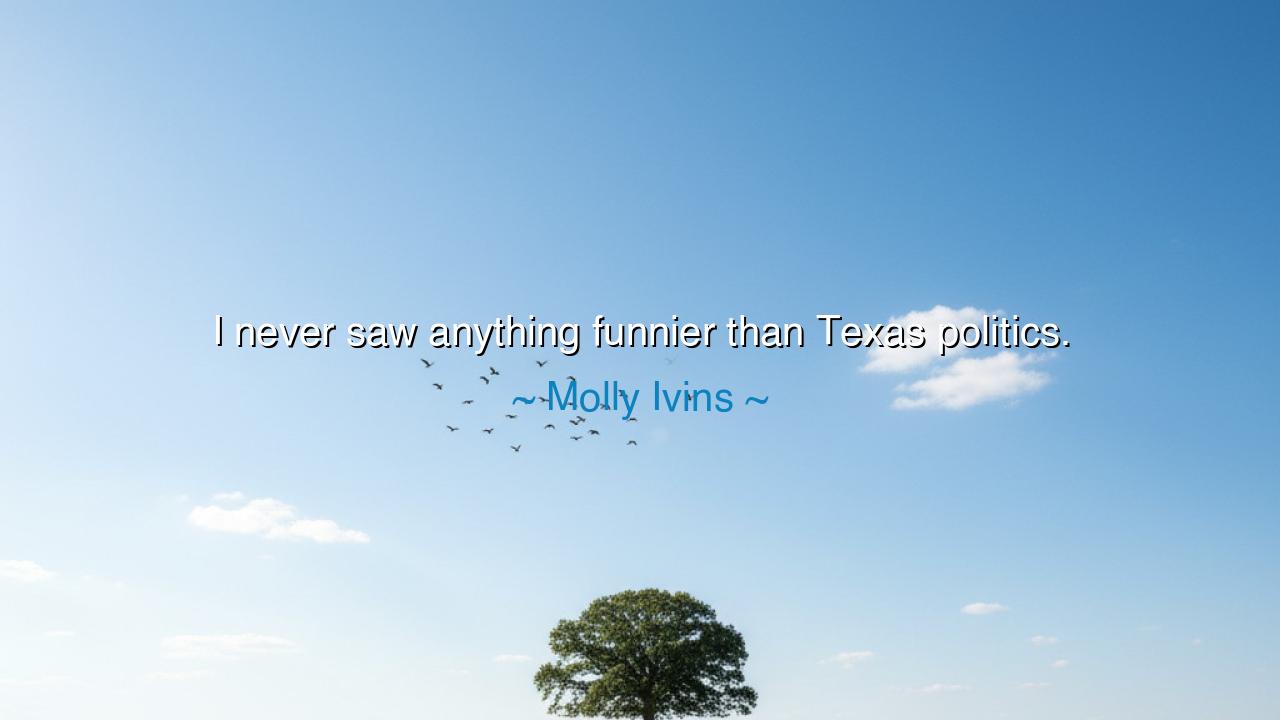
I never saw anything funnier than Texas politics.






Politics is often a realm of power and ambition, but at times, it becomes a stage for the absurd. When Molly Ivins, the sharp-witted American journalist, declared, “I never saw anything funnier than Texas politics,” she spoke with both humor and criticism, unveiling the chaotic and often theatrical nature of the political life in her home state. Beneath her laughter lies a deeper truth: that politics, when driven by egos and extremes, can resemble not the noble governance of a people, but a tragic comedy, filled with blunders, contradictions, and outlandish characters.
At the heart of Ivins’s words is the recognition that power often reveals folly. In Texas, a land known for its boldness and outsized personalities, political battles have historically been marked by dramatic speeches, fiery rhetoric, and sometimes, shocking decisions. Ivins observed that instead of reason and justice, many political moments in Texas unfolded like scenes from a wild play, where ambition and pride clashed in ways both dangerous and laughable. By calling it the “funniest,” she did not mean harmless, but rather so outrageous it demanded satire, lest despair consume the observer.
History provides many vivid examples of such theatrical politics. During the late 20th century, Texas politics saw figures who seemed larger than life, such as Governor Ann Richards, who wielded wit as a weapon, and Jim Hightower, who used populist fire to rally the masses. Ivins herself chronicled these characters with humor, revealing both their strengths and their follies. She believed that by laughing at the absurdities of politics, people could cut through the lies and see the truth more clearly. In this way, humor became not just entertainment, but resistance.
Yet, Ivins’s laughter also carried a warning. When politics becomes too absurd, it risks losing its connection to the people it serves. Policies that seem like jokes can have very real consequences for education, healthcare, and justice. The humor she wielded was not meant to dismiss the seriousness of these issues, but to highlight the gap between the grandiose performances of politicians and the everyday struggles of ordinary Texans. Through satire, she sought to awaken her audience to action, reminding them that laughter must be paired with vigilance.
On a deeper level, this quote speaks to the universal nature of politics itself. Whether in Texas, Rome, or ancient Athens, political arenas have always been filled with characters and drama, from noble heroes to shameless clowns. History repeats itself not only in tragedy, as the philosopher said, but also in farce. Ivins’s insight reminds us that to understand politics, one must see both its comic surface and its serious core, holding space for laughter even while working for change.
Let this wisdom echo through the ages: humor is a weapon against corruption and despair. As Molly Ivins teaches, when politics becomes a circus, the people must not turn away in sorrow, but rather face it with laughter and courage. For laughter exposes the truth, humbles the powerful, and gives strength to those who would rise above the chaos to build a more just and honorable world.






TTVan toan Trinh
Ivins' quote brings to light the chaotic and often laughable side of politics, especially in a place as politically charged as Texas. But does it also imply a kind of resignation, like saying 'it’s so absurd, all we can do is laugh'? Is humor a form of protest against the dysfunction in politics, or does it allow people to ignore the real work that needs to be done? What’s the balance between laughing and taking action?
AQAnh Quynh
I love how Ivins finds humor in something as serious as politics, but it makes me wonder—does this quote point to a larger problem in the way we view politics? Is there a danger in treating political discourse as a joke, especially when the outcomes affect so many people's lives? How do we reconcile the need for serious political engagement with the urge to laugh at its absurdities?
VHVuong Hoang
I find it interesting how Ivins sees Texas politics as something almost comical. It seems like she’s pointing to the chaos and unpredictability that often come with political life there. But is it healthy to laugh off such a serious matter? Can humor in politics act as a coping mechanism, or does it risk diminishing the importance of real governance? I'm curious if the humor detracts from addressing the root issues.
HLha letrong
Ivins' comment about Texas politics makes me think about the absurdities often found in politics, especially in states with larger-than-life personalities and colorful rhetoric. But, is this level of humor always a positive thing? Can it sometimes overshadow the serious issues that need attention? I get the sense that sometimes politics is treated too lightly, and the real problems get buried under humor and spectacle. What do you think?